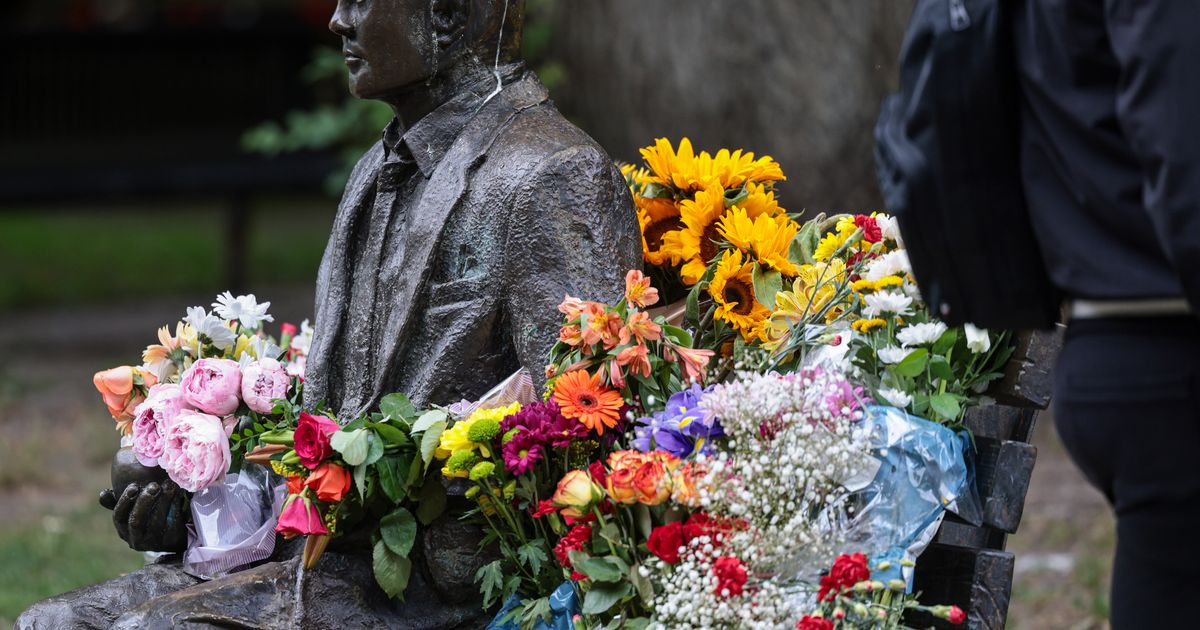“Society has finally caught up – but if we don’t say thank you, what are we?”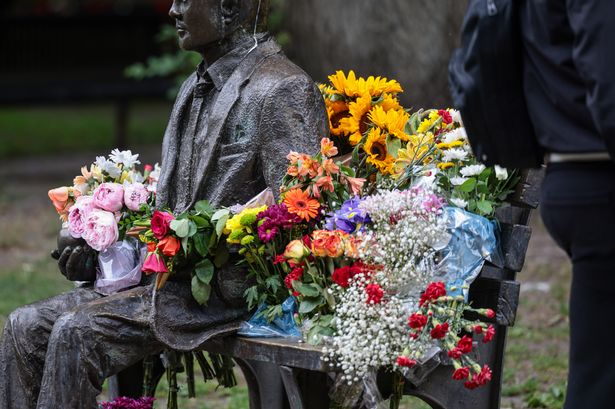 (Image: Kenny Brown | Manchester Evening News)
(Image: Kenny Brown | Manchester Evening News)
For most of the year, the figure on the bench sits alone.
The odd visitor might drop by to pay their respects – but for most passers-by, their eyes will likely slide over the man in bronze sitting quietly by the path. Just another statue in a city that is full of them.
But on one day out of 365, the statue of Alan Turing in Sackville Gardens in Manchester city centre bursts into riotous colour. The entire bench is piled high with flowers that make the statue look less like a memorial and more like a display in a florist’s.
Alan Turing was never properly recognised during his lifetime. His pioneering work breaking German ciphers saved countless lives during WWII, and his later work at the University of Manchester contributed to the development of the first ever computers.
But it was while he was living in Wilmslow that a chain of events began that would lead to his untimely death aged just 41.
Turing was burgled and, in reporting the incident to the police, disclosed to them that he had a sexual relationship – with another man.
A criminal offence at the time, Turing was convicted of ‘gross indecency’ in 1952 and accepted a punishment of chemical castration rather than serve time in prison. Just two years later, he was found dead by his housekeeper, with the inquest returning a verdict of suicide by cyanide poisoning.
The statue now honouring him in Sackville Gardens was placed their due to its proximity to both the University of Manchester buildings and the gay bars of Canal Street ‘where apparently he spent most of his evenings’, sculptor Glynn Hughes told the BBC.
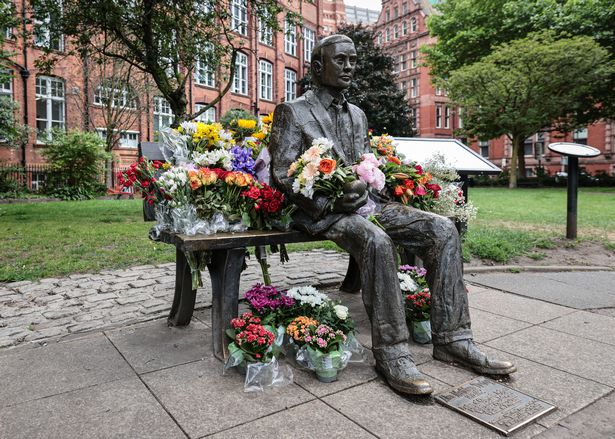 The statue today in Sackville Gardens(Image: Kenny Brown | Manchester Evening News)
The statue today in Sackville Gardens(Image: Kenny Brown | Manchester Evening News)
70 years after his death, Turing has gone on to be widely recognised, now considered to be the father of theoretical computer science with many statues, awards and theorems named after him.
An icon in two sub-cultures, as well as being a symbol of the injustices faced by gay people in Britain’s all-too-recent past, Turing is a hero to the computer science and mathematics community.
He was officially pardoned by Queen Elizabeth II in 2013 and has gone on to appear on the £50 banknote, launched on his birthday in 2021. And it was on his birthday in 2013 that computer science lecturer Joe Reddington decided to mark the occasion with a bunch of flowers.
“It started entirely by accident,” he told the M.E.N. “I just happened to be in Manchester around the time of Alan’s birthday, and I thought it would be quite a nice gesture and nice way to remember someone.
“I was a PhD student at the time and I mentioned it to some other students I knew. One thing led to another and suddenly I had people pledging donations from Cambridge, Bristol, France, even Washington.”
“So I found myself walking in the darkness carrying 20 bunches of flowers across the park. We set up the flowers and had a nice moment of solemn reverence.”
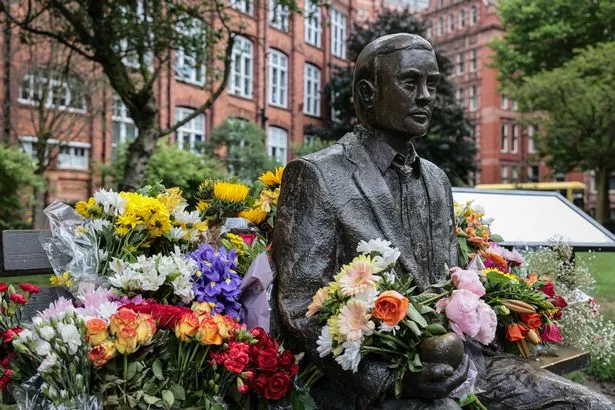 (Image: Kenny Brown | Manchester Evening News)
(Image: Kenny Brown | Manchester Evening News)
The next morning, someone posted a picture of the flower-covered statue online where it gained thousands of retweets. The following year, Joe decided to ‘do it properly’, posting on Reddit and emailing computer science departments around the world.
“A whole lot more people got involved,” he said. “And we’ve raised a total of £35,000 ever since.”
Joe now works in London, so relies on the help of ‘tireless volunteers’ to install the flowers on the bench. Pledgers from all over the country, Europe and the US give £15, which is used to purchase a bunch of flowers.
The left-over funds then go to Special Effect, a charity developing innovative technology to allow people with disabilities to play video games.
“They do wonderful work helping people with complex needs have fun,” Joe said. “They bring an enormous amount of joy to enormous numbers of people.”
The culture around Turing’s legacy has changed in the last few decades. In 2009 the British programmer John Graham-Cunning launched a petition urging the British government to apologise for Turing’s prosecution, which would eventually receive more than 37,000 signatures and lead to his eventual pardon in 2013.
But just ten years earlier in 1999, sculptor of the Manchester memorial Glynn Hughes told the BBC that his appeal to raise funds for the statue had ‘failed to receive financial backing from a single computer company’. The statue was eventually unveiled in 2001.
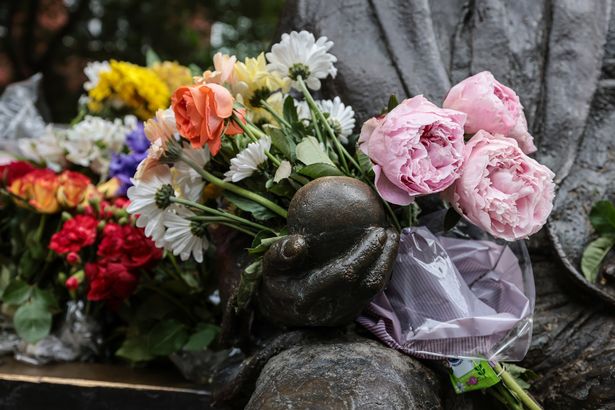 (Image: Kenny Brown | Manchester Evening News)
(Image: Kenny Brown | Manchester Evening News)
“The flowers are a nice thing to do – a gesture to remember someone who was important, and who suffered unnecessarily,” said Joe.
“It’s important to know that not all heroes had guns and it’s important to honour our history – and to recognise when we as a culture have made mistakes, and do our best to correct them.”
“This project started as a before he was pardoned,” he continued. “It started before he was on a bank note.
“Now I think society has finally caught up, and we’re just saying thank you. If we don’t say thank you, then what good are we?”
